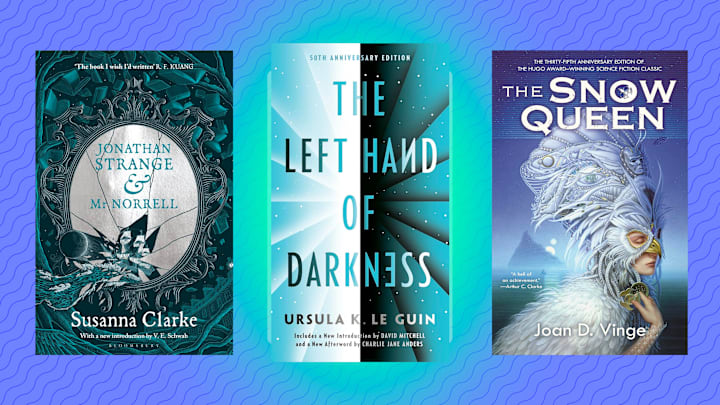In the realm of science fiction and fantasy, there’s no accolade more prestigious than the Hugo Award. Established in 1953 and held annually, the Hugo honors the best science fiction and fantasy short stories, novellas, and full-length works published in the previous calendar year.
When it comes to the Hugo, the Best Novel Award remains the most coveted. The first female author nominated for the Best Novel Award was Leigh Brackett, whose dystopian work, The Long Tomorrow, narrowly missed out on the top spot in 1956.
Since then, women have scooped the Best Novel Award a total of 28 times, including every year from 2016 to the present. With this in mind, check out this brief selection of winning novels written by women from across the Hugo’s history.
- The Left Hand of Darkness by Ursula K. Le Guin (1969)
- The Snow Queen by Joan D. Vinge (1980)
- Doomsday Book by Connie Willis (1992)
- Jonathan Strange & Mr Norrell by Susanna Clarke (2005)
- Some Desperate Glory by Emily Tesh (2024)
The Left Hand of Darkness by Ursula K. Le Guin (1969)

Born in Berkeley, California, in 1929, Ursula Kroeber Le Guin is a towering figure in the science fiction and fantasy world. She produced 23 novels and dozens of short stories over her lifetime. Her Earthsea fantasy series collected numerous awards, but it was her science fiction novel, The Left Hand of Darkness, which led to her becoming the first woman to win the Hugo for Best Novel. Set in the fictional Hainish universe, the story follows human Genly Ai in his diplomatic mission as an envoy of the Ekumen confederation to the planet Gethen. It all sets the stage for an evocative examination of the roles of sex and gender in culture.
The Snow Queen by Joan D. Vinge (1980)

American author Joan D. Vinge turned to classic literature as inspiration for this compelling story, which takes place on the oceanic planet Tiamat. The title comes from Hans Christian Andersen’s 1844 fairy tale of the same name—a story that has inspired numerous adaptations over the years. As with Andersen’s classic work, Vinge conjures a world of great subtlety and depth, exploring concepts of good and evil as she chronicles the life of the titular Queen and her scheme to extend her rule artificially. The novel proved so popular that Vinge penned three follow-ups: World’s End, The Summer Queen, and Tangled Up In Blue.
Doomsday Book by Connie Willis (1992)

Connie Willis holds a record-breaking 11 Hugo Awards (three for Best Novel, four for Best Novella, two for Best Novelette, and a further one for Best Short Story) plus seven Nebula Awards—more major accolades than any other science fiction and fantasy writer.
This superb time-traveling tale is one of Willis’s best, switching between dual narratives that are roughly 700 years apart. Doomsday Book is set in a world where historians routinely travel backward in time to investigate the past. When Kivrin Engle, a young academic, convinces her instructor to let her journey back to Oxford, England, in the year 1320, things go awry. Engle finds herself trapped in a medieval world that seems curiously different from the one she was expecting.
Jonathan Strange & Mr Norrell by Susanna Clarke (2005)

A sensation upon its publication, this remarkably accomplished novel was, incredibly, author Susanna Clarke’s debut. Bloomsbury, which published the book, was so confident about its potential success that they ordered an initial printing of 250,000 copies.
Their faith was justified in the end; the novel would go on to win the Hugo for Best Novel and was also long-listed for the Man Booker Prize. Clarke’s story takes place in an alternate version of 19th-century England, in a world where magic was once commonplace but has since faded. When the titular Jonathan Strange and Mr Norrell (two very different characters) develop magical abilities, the stage is set for a wonderfully unforgettable and tangled tale.
Some Desperate Glory by Emily Tesh (2024)

London-born Emily Tesh is the latest winner of the Hugo Best Novel Award. Her first full-length published work rivals William Gibson for its far-sightedness and thrilling action, and it is set in a universe where an alien confederation has destroyed Earth. It follows the story of Kyr, a human living on Gaea Station—the last outpost of independent humanity—who is arbitrarily assigned the role of “breeder.” Kyr escapes the colony, setting in motion a chain of events that will alter history. As a coming-of-age tale also focused on queer themes, it has been rightly praised for its well-rounded portrayal of certain challenges, and it’s a novel that asks difficult questions of its characters to great effect.
Read More About Books Below:
